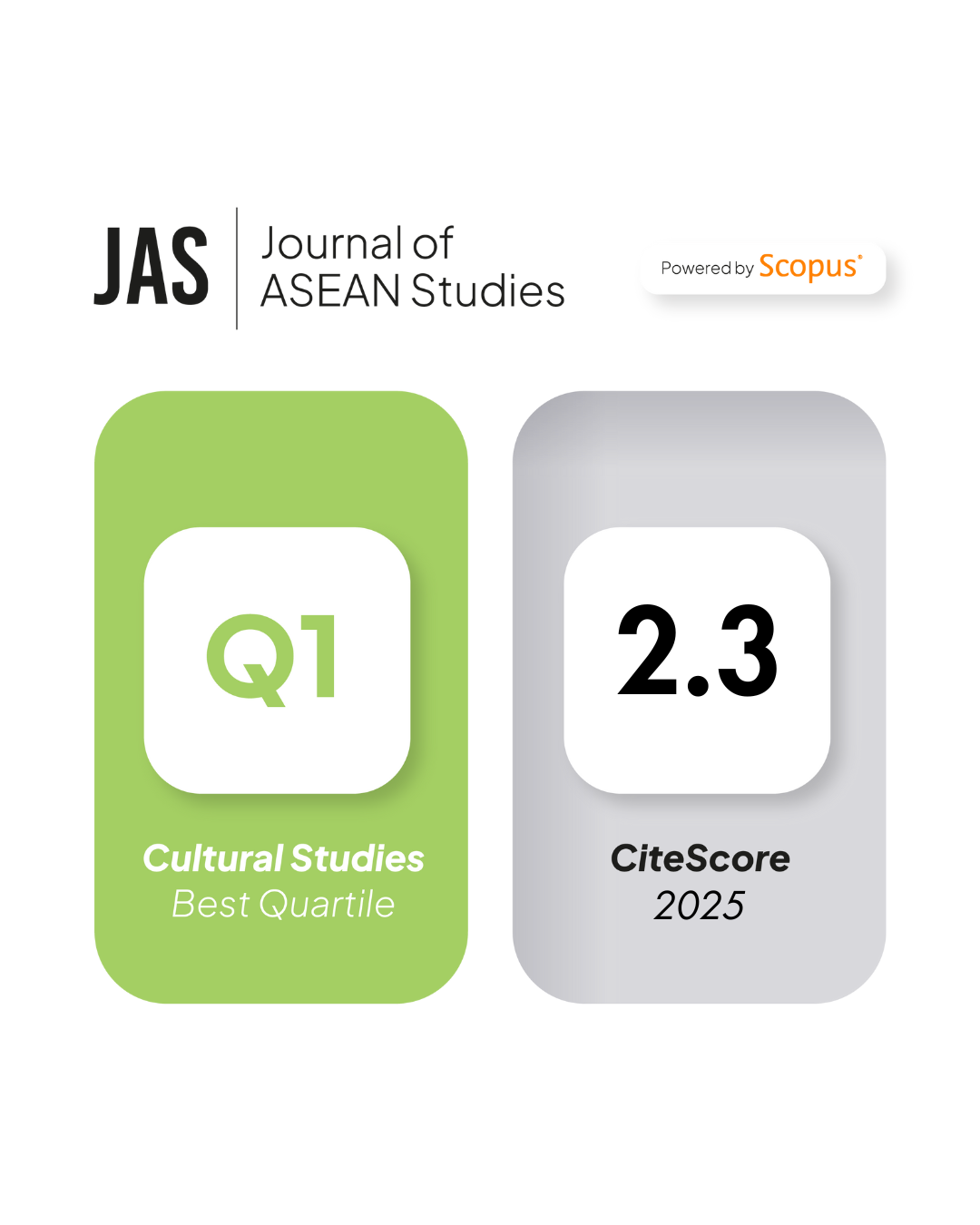The Effectiveness of De-Radicalization Program in Southeast Asia: Does It Work? The Case of Indonesia, Malaysia, and Singapore
DOI:
https://doi.org/10.21512/jas.v5i2.4302Keywords:
Terrorism, Radicalization, De-radicalization, and soft powerAbstract
The counterterrorism approach is still harnessed to tackle the spread of radical movement and it is deemed to be a soft strategy for a long term purpose. In the several past years, the government has been conducting de-radicalization program in attempt to bring the terrorist inmates safely to social life after the prison release. This program commonly conducted in the prison while the inmates serving the jail time for terrorism-related offences. Nevertheless, debates rise due to the fail of the program result which prove some recidivists appear to execute another terror attack. An opinion of prison environment which is considered  as a potential breeding ground for radicalization aggravates the government effort to reintegrate the prisoners into normal society. This worsened by the activities like recruiting other prisoners and supporting extremist groups from prison which still often occur in Indonesia. Taking two examples from international scope, France has announced to close its de-radicalization program, meanwhile United States under Trump’s leadership prefer to heightened the sentences related to terrorism and to ban Muslim migrants excessively. Meanwhile, Indonesia still convinces that de-radicalization program is one of the most strategic approaches in fighting terrorism, and it is deemed as a soft power with a long term oriented. Therefore, this paper will analyze the effectiveness of the program through theories, facts, and phenomenon. Thus it will yield some recommendations for Indonesian government in strengthening and reshaping its policies.
References
Mulcahy, Elizabeth, Merrington, Shannon, & Bell, Peter. The Radicalization of Prison Inmates: Exploring Recruitment, Religion and Prisoner Vulnerability, Journal of Human Security, volume 9, issue 1, 2013, Australia
Neuman, Peter. “Prison and Terrorism Radicalization and De-radicalization in 15 Countries”, A Policy Report Published by ICSR (International Centre for the Study of Radicalization and Political Violence), King’s College London, 2010, UK
Johnston, Amanda. Assessing the Effectiveness of De-Radicalization Programs on Islamist Extremist. Thesis. Naval Postgraduate School, Monterey, California, December, 2009.
Ismail, Huda & Susan Sim in the article of “From Prison to Carnage in Jakarta: Predicting Terrorist Recidivism in Indonesia’s Prisons”, accessible at https://www.brookings.edu/opinions/predicting-terrorist-recidivism-in-indonesias-prisons
Horgan, John & Braddock. Rehabilitating the Terrorist?: Challenges in Assessing the Effectiveness of De-radicalization Programs. Routledge, Vol. 22, 2010
Hikam, Muhammad. De-radikalisasi: Peran Masyarakat Sipil Indonesia Membendung Radikalisme. Penerbit Buku Kompas, Jakarta, 2015.
Ashour, O. De-Radicalization of Jihad? The impact of Egyptian Islamist Revisionists on al-Qaeda. Perspectives on Terrorism, 2(5), 11-14, 2008
Rafique, Zil-E Huma & Ahmed, Mughees. De-radicalization and Rehabilitation Effort Analysis of Anti-Terrorism Activities in Pakistan, International Journal of Humanities and Social Sciences (IJHSS) ISSN 2319-393X Vol. 2, Issue 1, Feb 2013, 115-124
Dechesne, Mark. Deradicalization: not soft, but strategic. Crime, Law and Social Change, Springer
Verlag, 2011, pp.287-292.
Dechesene, Mark. The Strategic Use of Deradicaliation, Journal EXIT, Deutschland, August, 2014
Rabasa, et all. Deradicalizing Islamist Extremist, RAND Corporation, International Security and Defense Policy, 2016
Martin, D. “Bali Bomber Now Champaighn to Stop Terrorism,” Australian Broadcasting Corporation News, September 20, 2007
Istiqomah, De-radicalization Program in Indonesia Prisons: Reformation on the Correctional Institution, University of Brawijaya, Malang, East Java, Indonesia, 2011
Payne. K. Winning the battles of Idea: Propaganda, Ideology, and Terror, Studies in Conflict and Terrorism, 2009.
Alonso et all. Radicalization Processes Leading to Acts of Terrorism: A concise Report prepared by the European Commission's Expert Group on Violent Radicalisation, May 15, 2008
Silber, Mitchell and Bhatt, Arvin. Radicalzation in the West: The Homegrown Threat, The New York City Police Department, 2007, US
M. Asla, B Othman, and Rosili, De-radicalization Programs in South-East Asia: A Comparative Study of Rehabilitation Programs in Malaysia, Thailand, Indonesia, and Singapore, Journal of Education and Social Sciences, Vol. 4, 2016
M. Hafez and C. Mullins. The Radicalization Puzzle: a theoretical synthesis of empirical approaches to homegrown extremism, Routledge: Taylor & Francis, Calhoun: The NPS Institutional Archieve, Studies in Conflict and Terrorism, V.38, pp. 958 -975, USA, 2015
Borum, Randy. Radicalization into Violent Extremism I: A Review of Social Science Theories Journal of Strategic Security, Volume 4, Number 4 Volume 4, No. 4, Winter 2011
Op.cit. Hikam 2016
Nye, Joseph. Soft Power: The Means To Success in World Politics, 2004
Wilson, Ernest. Hard Power, Soft Power and Hard Power. The ANNALS of the American Academy of Political and Social Science. SAGE Publications, 2008
Alshehri, Abdulhadi. Soft Power as an Alternative to Hard Power in Counterterrorism in Saudi Arabia, Strategy Research Project, US Army War College, Carlisle Barracks, 2010
Boucek, Christopher, “Saudi Arabia’s “soft” counterterrorism strategy: prevention, rehabilitation, and Aftercare” Carnegie papers (Washington: September 2008)
See www.bnpt.go.id
Sari, Siti. Strategi Badan National Penanggulangan Terorisme (BNPT) Dalam Upaya Deradikalisasi Pemahaman Agama Narapidana Terorisme di Lembaga Pemasyarakatan (Cipinang). An Essay to obtain Bachelor Degree in University of Syarif Hidayatullah, Jakarta, 2016
“152 sent home after undergoing deradicalization program”, The Jakarta Post
“Indonesia to Boost Deradicalization After Islamic State Attack”, by Prashanth Parameswaran
Sumpter, Cameron. Countering Violent Extremism in Indonesia: priorities, practice, and the role of civil society. Journal for Deradicalization No. 11, 2017.
Ibid.
Aslam et all. De-Radicalization Programs In South-East Asia: A Comparative Study Of Rehabilitation Programs In Malaysia, Thailand, Indonesia & Singapore. Journal of Education and Social Science, Vol 4 (June), 2016
Ibid.
Ismail, L. (2016, January 26). Malaysia’s Deradicalization Programme has 95 per cent success rate. New Straits Times Online.
Danson Cheong , Benjamin Tan and Rebecca Tan Hui Qing (2016, March 27). 3 in 4 Singaporeans surveyed believe this to be the case; Changi Airport seen as likeliest target. http://www.straitstimes.com
Lam Lydia. Singapore under highest terror threat in recent years: 8 key points from MHA's terror report. http://www.straitstimes.com.
Charlotte Taylor and Rachael Roman. New study abroad program in Singapore to focus on CVE and deradicalization. http://www.start.umd.edu/
Opcit. Aslam
Chasmar, Jessica (2017, July, 31). France closes failed deradicalization center for jihadists. https://www.washingtontimes.com
Spencer, Robert (2017, July, 31). France’s only jihadi “deradicalization” center is closing — it was voluntary, and it was empty. https://www.jihadwatch.org
“French Senate says deradicalisation programme is failing”, 30 March 2017, http://www.euronews.com
James McAuley (2017, February, 24). France’s deradicalization centers seen as a ‘total fiasco’. https://www.washingtonpost.com/
Soeren Kern (2017, February, 26). France: Deradicalization of Jihadists a "Total Fiasco", https://www.gatestoneinstitute.org/
Maddy Crowell (2017, September, 28). What Went Wrong With France's Deradicalization Program?, https://www.theatlantic.com/
Irfan Yusuf (2016, April, 26). Deradicalization Program = Do They Work? http://www.smh.com.au/
Koehler, D. (2017), Understanding De-radicalization: Methods, Tools and Programs for Countering Violent Extremism (Routledge: New York), p. 172
Pettinger, Tom. De-radicalization and Counter-radicalization: Valuable Tools Combating Violent Extremism, or Harmful Methods of Subjugation?. Journal for Deradicalization, 2017
Sarah Marsden. (2015, September, 2). Terrorist recidivism: ‘deradicalisation’ and reintegration, http://www.radicalisationresearch.org/
Op.cit. Johnston
Kruglanski, Arie et all. The Psychology of Radicalization and Deradicalization: How Signiï¬cance Quest Impacts Violent Extremism, Advances in Political Psychology, Vol. 35, Suppl. 1, 2014
Op.cit. Johnston
Op.cit. Deschene
Sukabdi, Zora. Terrorism In Indonesia: A Review On Rehabilitation And Deradicalization. Journal of Terrorism Research, 2015.
Sapiee, Marguerite. (2016). Indonesia needs stronger deradicalization progam. http://www.thejakartapost.com/news/2016
Lestari, Katharina. (2016). Indonesia’s Deradicalization Program Under Fire. https://www.ucanews.com/news
Povera, Adib. Malaysia's deradicalisation programme internationally recognised: Zahid. Accessible on https://www.nst.com.my/news/2016
Besant, Daniel. (2016, January 12) Is Malaysia a world leader in the deradicalisation of Islamist miltants?. http://sea-globe.com/malaysia-islamist-deradicalistion/
Hassan, M. H. (2007). Singapore’s Muslim community-based initiatives against JI: Perspective on Terrorism. Retrieved http://www.terrorismanalysts.com/pt/index.php
Aslam. Op.Cit 2016
Saleh, Layla. Soft Power, NGO, and the US War on Terror. Dissertation. University of Wisconsin Milwaukee, December, 2012
Nye. Op.Cit.
Hoeft, Gabriel. 'Soft' Approaches to Counter-Terrorism: An Exploration of the Benefits of Deradicalization Programs. the International Institute for Counter-Terrorism (ICT), 2015
Nye. Op.Cit


























